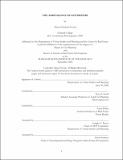| dc.contributor.advisor | Terry S. Szold. | en_US |
| dc.contributor.author | Novak, Alison Elizabeth | en_US |
| dc.contributor.other | Massachusetts Institute of Technology. Center for Real Estate. | en_US |
| dc.date.accessioned | 2010-09-22T15:51:33Z | |
| dc.date.available | 2010-09-22T15:51:33Z | |
| dc.date.issued | 2006 | en_US |
| dc.identifier.uri | http://hdl.handle.net/1721.1/58630 | |
| dc.description | Thesis (M.C.P.)--Massachusetts Institute of Technology, Dept. of Urban Studies and Planning; and, (S.M. in Real Estate Development)--Massachusetts Institute of Technology, Dept. of Urban Studies and Planning, Center for Real Estate, 2006. | en_US |
| dc.description | This electronic version was submitted by the student author. The certified thesis is available in the Institute Archives and Special Collections. | en_US |
| dc.description | "September 2006." | en_US |
| dc.description | Includes bibliographical references (p. 104-110). | en_US |
| dc.description.abstract | This thesis explores the paradox faced by 25-34 year-old, White, well-educated persons who choose to live in predominantly low-income neighborhoods. In particular, this thesis asks if gentrifiers are aware of gentrification and their role in it, and then how they navigate that paradox. The thesis is grounded in interviews with residents of three Boston neighborhoods that are in various stages of gentrification: the South End, Jamaica Plain, and Dorchester. The interviews are framed within a synthesis of academic theory, a description of the introduction of the term "gentrification" to the United States, and common perceptions of gentrifiers as portrayed in academic and popular cultural. This framework is meant to expose the difficulty of using the term consistently, and its emotional power. Readers who are not familiar with the term or its complex background should find this framework helpful in forming a basic and thoughtful understanding. More advanced readers should use this thesis to critically explore their own position and build a more sophisticated understanding. Though the core meaning of the term "gentrification" has not changed substantially from its original definition in 1964, a wide variety of qualifiers have been attached to the term resulting in highly positive and highly negative connotations. | en_US |
| dc.description.abstract | (cont.) One explanation for these wildly varying perspectives is that gentrification is a topic that reflects larger human issues such as self and group identity, as well as socio-economic class. The result is twofold. One, these issues are so fundamental that discussions involving them have highly emotional stakes. Two, the topic brings together interdisciplinary academics and practitioners who often have conflicting paradigms and perspectives. Many of the gentrifiers reported that they live in their neighborhood due to practical matters, such as affordable homeownership, as well as less easily defined concerns, such as the sense of belonging to a diverse community. Nearly all of the gentrifiers expressed inner conflict over being a potentially negative force in the neighborhood, and a large number described ways they attempted to mitigate or explain away that force. Using the reflections of this group of gentrifiers to better understand their motivations and concerns, should enable community planners and real estate developers to work more successfully in gentrifying neighborhoods by tapping into the human, social, and economic capital brought by gentrifiers. Planners and developers are encouraged to take a mutual gains approach, emphasizing opportunities for connection rather than polarization. | en_US |
| dc.description.statementofresponsibility | by Alison Elizabeth Novak. | en_US |
| dc.format.extent | 111 p. | en_US |
| dc.language.iso | eng | en_US |
| dc.publisher | Massachusetts Institute of Technology | en_US |
| dc.rights | M.I.T. theses are protected by
copyright. They may be viewed from this source for any purpose, but
reproduction or distribution in any format is prohibited without written
permission. See provided URL for inquiries about permission. | en_US |
| dc.rights.uri | http://dspace.mit.edu/handle/1721.1/7582 | en_US |
| dc.subject | Urban Studies and Planning. | en_US |
| dc.subject | Center for Real Estate. | en_US |
| dc.title | The ambivalence of gentrifiers | en_US |
| dc.type | Thesis | en_US |
| dc.description.degree | S.M.in Real Estate Development | en_US |
| dc.description.degree | M.C.P. | en_US |
| dc.contributor.department | Massachusetts Institute of Technology. Center for Real Estate | en_US |
| dc.contributor.department | Massachusetts Institute of Technology. Department of Urban Studies and Planning | |
| dc.identifier.oclc | 124064295 | en_US |
